How Replit used legal threats to kill my open-source project
I think you should take it down and stop working on it. I'll be engaging our lawyers on Monday if it's still up by then. [...] We were a tiny company when you interned with us [...] Luckily we're bigger now, and crucially have a lot of money to pay for top lawyers now if we're forced to go that route.
I received an official response from Replit and my open-source project will be back up soon; please see the bottom of the blog post for an update. The rest of the content here will remain as a historical artifact.
Hi, my name is Radon. I graduated college last year and now work as a software engineer in DevOps/Infrastructure. In my free time, I also maintain a number of open-source projects.
While I was in college, I interned at the startup Replit. This blog post is the story of how Replit is using legal threats and their venture-capital funding to bully me into shutting down an open-source project they don’t like.
Table of contents
- What’s Replit?
- What was my open-source project?
- What happened when I shared my open-source project with Replit?
- What happened after Replit threatened to sue me?
- Is Replit right?
- Why would Replit do this?
- How did Replit respond to this blog post?
- So is Riju back up now?
What’s Replit?
Replit makes a webapp you can use to run code online in different programming languages. This is nothing new (just Google “run python online” for proof), so Replit’s value proposition is extra features like sharing your work, installing third-party packages, and hosting webapps.
I worked for Replit in Summer 2019, where I was asked to rebuild Replit’s package management stack and make it open-source. If you like reading about tech stuff, here’s the post I wrote for Replit’s blog, and here’s the code on GitHub.
I took a job elsewhere in Summer 2020, but still chatted with them occasionally by email when they reached out to tell me about something cool Replit had developed.
What was my open-source project?
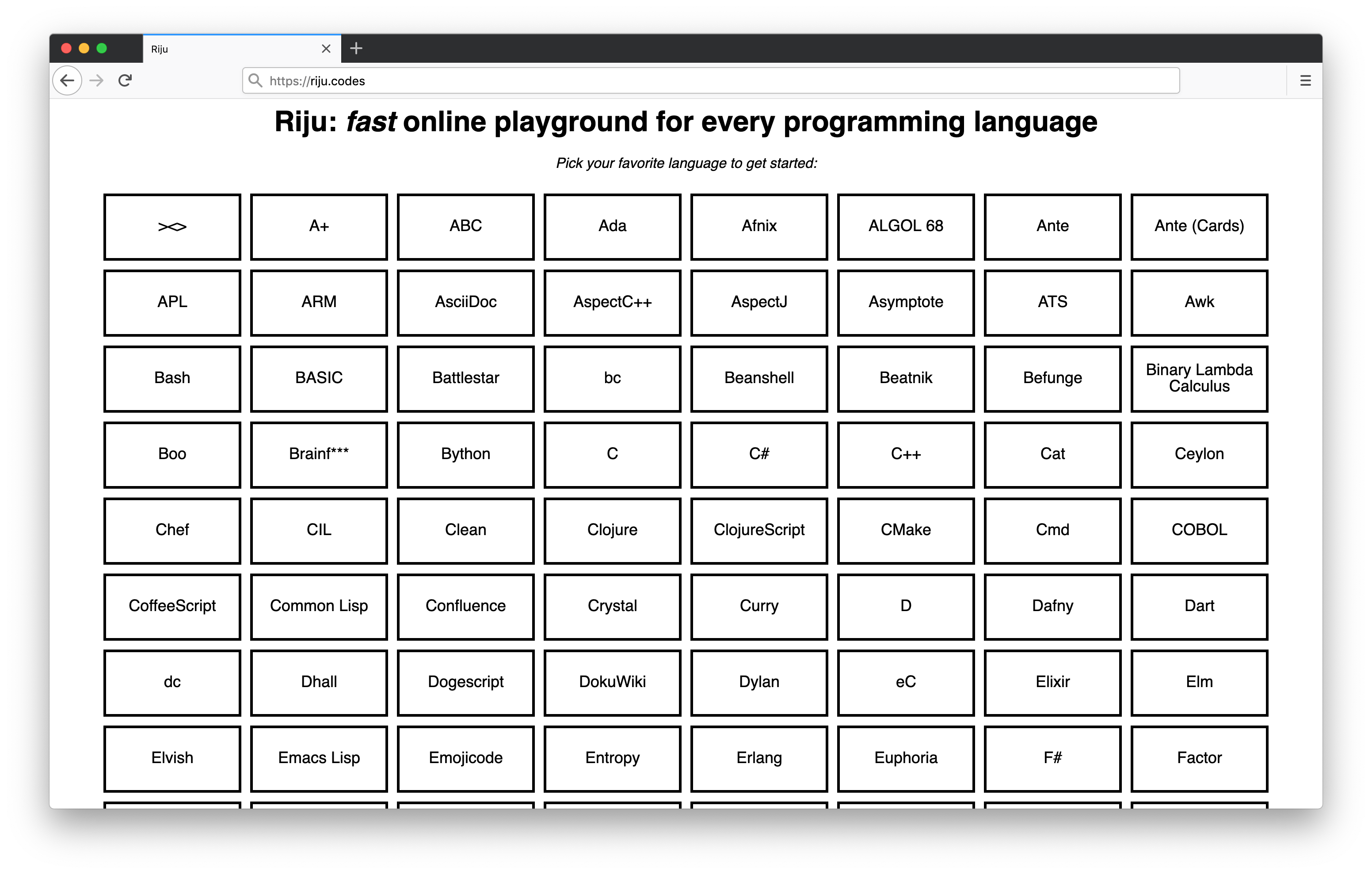
The aspect of Replit that I really enjoyed was how it supported lots of different programming languages. (I wrote another blog post for Replit about how they do that.) That got me thinking: how many programming languages could you possibly cram into a single website?
To explore that question, I put together my own little webapp that could run code online. After about a day, I had something that worked. (If you’re wondering why it was so fast—it turns out you only need 30 lines of code to let people run Python code in a webapp! This may be why there are so many websites for running Python online…)
After it was working, I started adding as many different programming languages as I could. As you can see from this excerpt of my project’s version history, I got a little overexcited:
languages
---------
2020-06-05 df9ba38 Initial commit 0
2020-06-05 5e3a4a4 Install some packages into a Docker image 0
2020-06-05 e937c8f Simple Express server with "Hello world" 0
2020-06-06 0961498 Embed terminal on frontend app 0
2020-06-06 c66cf63 Embed Monaco editor on frontend 0
2020-06-06 27ab1f7 Add "run" button 0
2020-06-06 f417858 You can run Python code now 1
2020-06-07 d543081 You can run many languages now 8
2020-06-07 e2a3e71 All languages 17 working now 17
2020-06-07 473c50c ALL THE LANGUAGES 25
2020-06-08 3718315 even more languages 33
2020-06-08 548c1c1 repl.it superiority!! 38
2020-06-08 1ae424f More languages, we need all the languages 48
2020-06-09 c34ccf2 A lot more languages 77
2020-06-09 846caf2 At this point the number of languages is absurd 79
I eventually ended up with 216 languages, including all 38 languages from Replit, all 100 languages from Yusuke Endoh’s “Quine Relay”, and a good deal more besides. You might ask: Why did I spend so much time adding obscure programming languages to a webapp nobody was going to use? Well, let me put it this way: Is it the weirdest 2020 hobby you’ve seen?
What happened when I shared my open-source project with Replit?
One day, I got an email from Replit letting me know about a new feature they released. I figured this was a good time to share my open-source project with them, in case they wanted to take inspiration from any of my work:
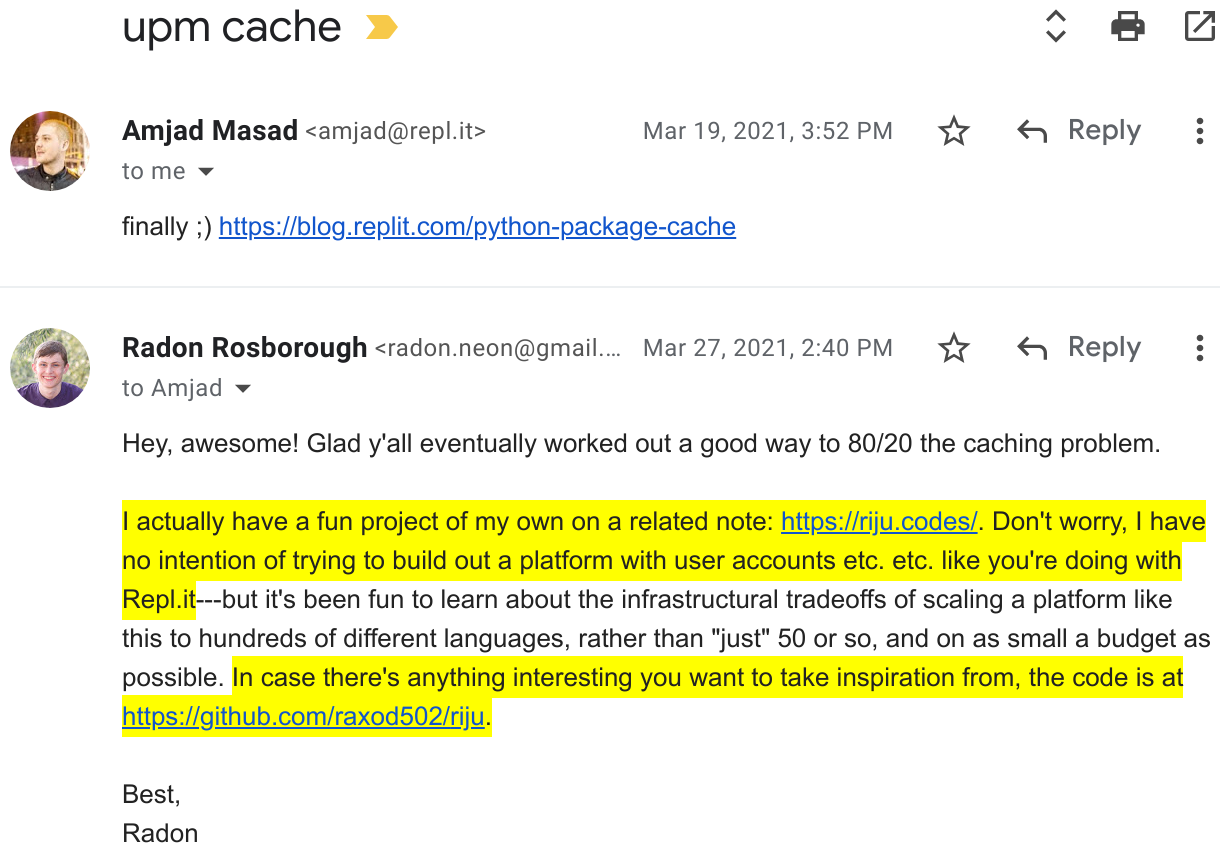
At first, I got a positive response. But then, 30 minutes later, out of nowhere, Replit accused me of unethical behavior and stealing their design:
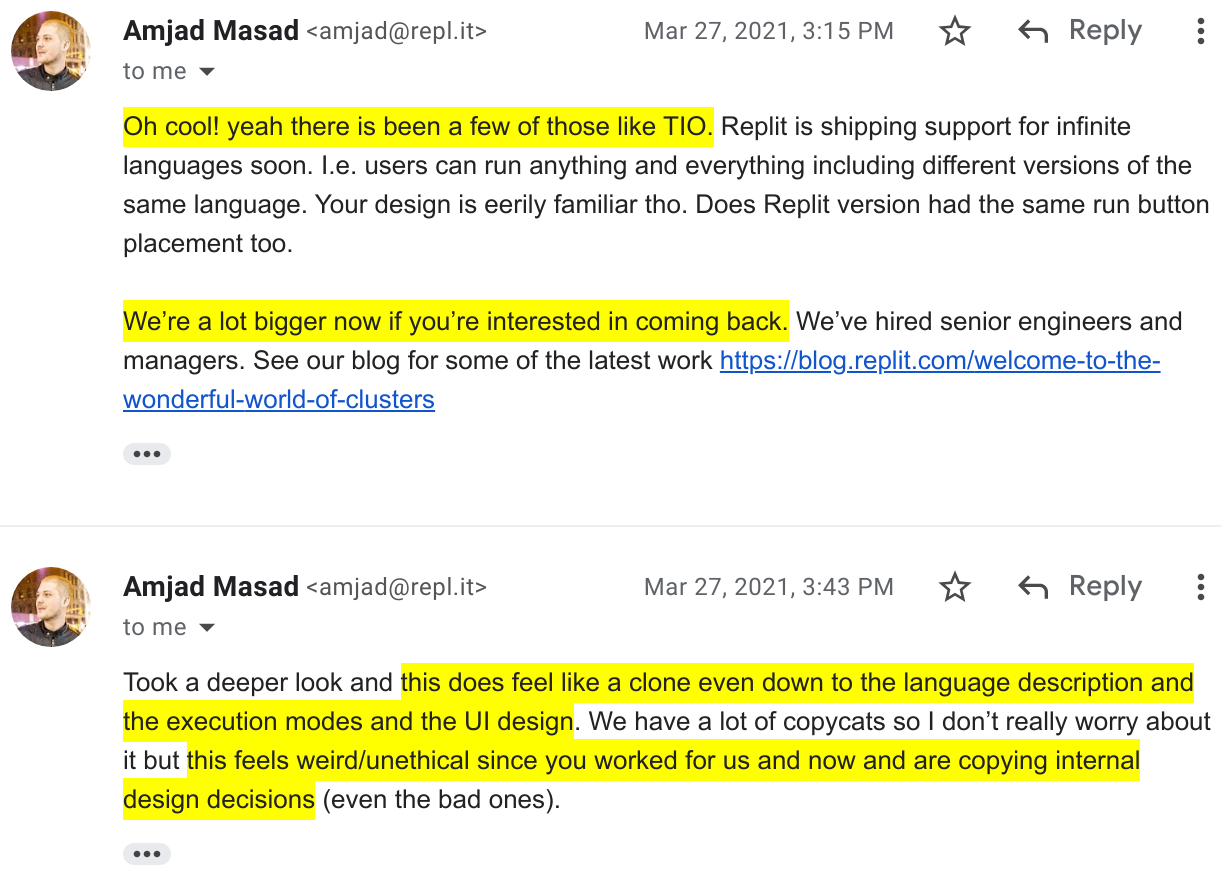
Now, none of the ideas I used in my open-source project were “internal design decisions”: they’ve all been published publicly on Replit’s blog (I knew this because I’d been asked to write some of those blog posts during my internship). And my project also wasn’t any more of a Replit clone than any of the other websites on the first few pages of Google results for “run python online”, most of which look exactly the same:
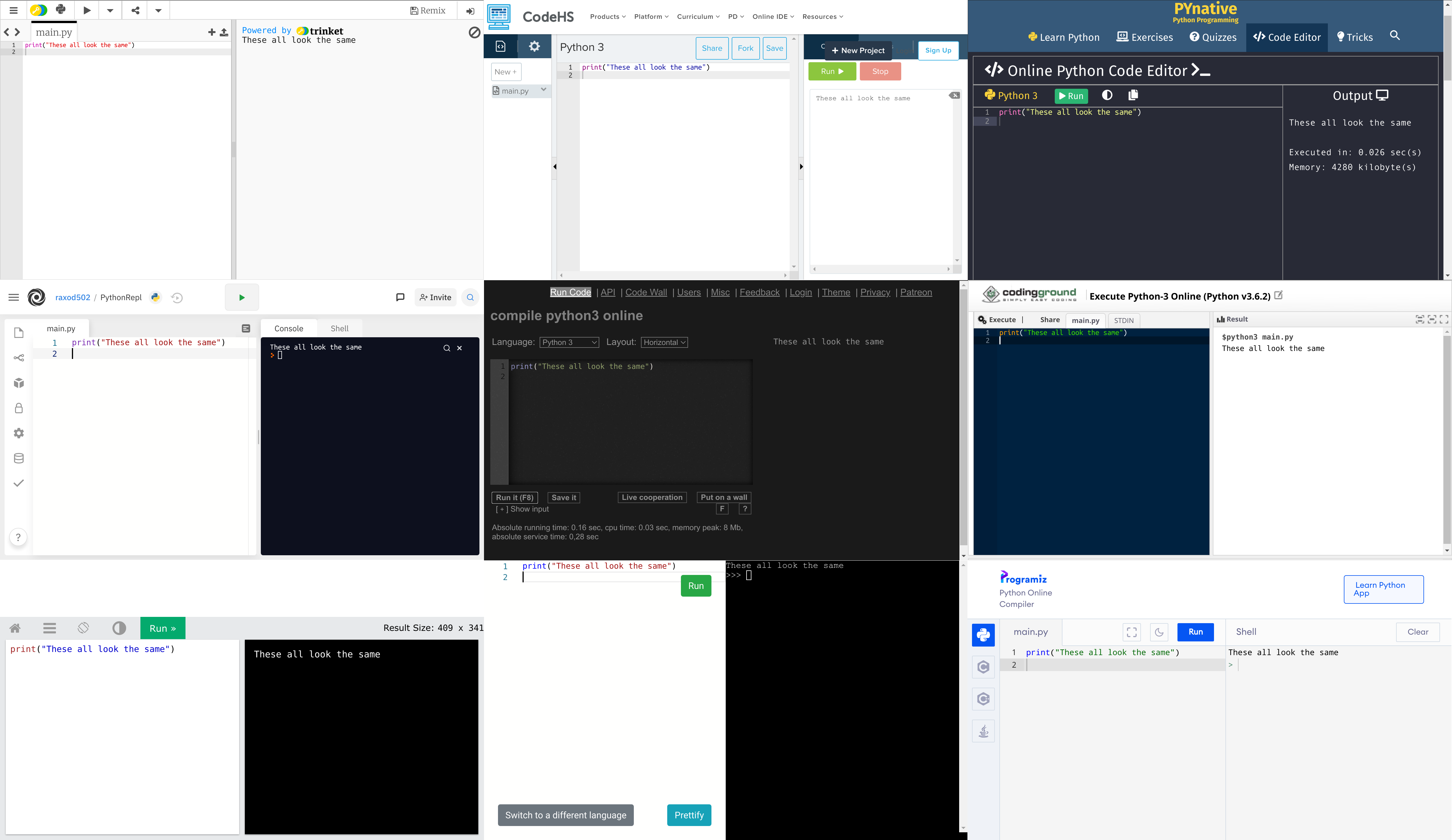
But I figured I might have missed something, so I asked for details:

(The rest of this email is basically me repeating the previous paragraph of this article, but with a lot more technical details. You can read the whole email on Imgur, mirrored on the Internet Archive.)
Unfortunately, Replit refused to provide any specifics on what they were saying I had done wrong, reiterated their previous statements, and threatened me with a lawsuit:
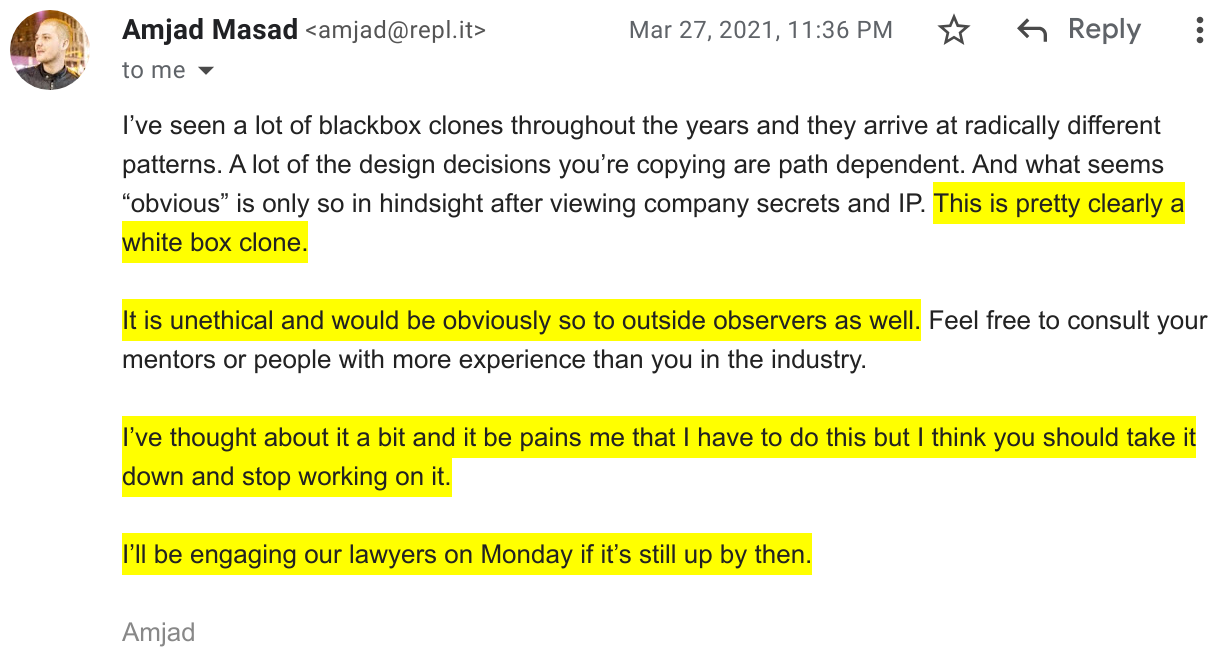
And then just to put a cherry on top, Replit sent me another email reminding me that they just raised $20 million from their investors last month, and they weren’t afraid to use it against me. The “me” in question being one of their previous interns who just graduated from college a year ago, and who isn’t running any kind of commercial operation whatsoever.
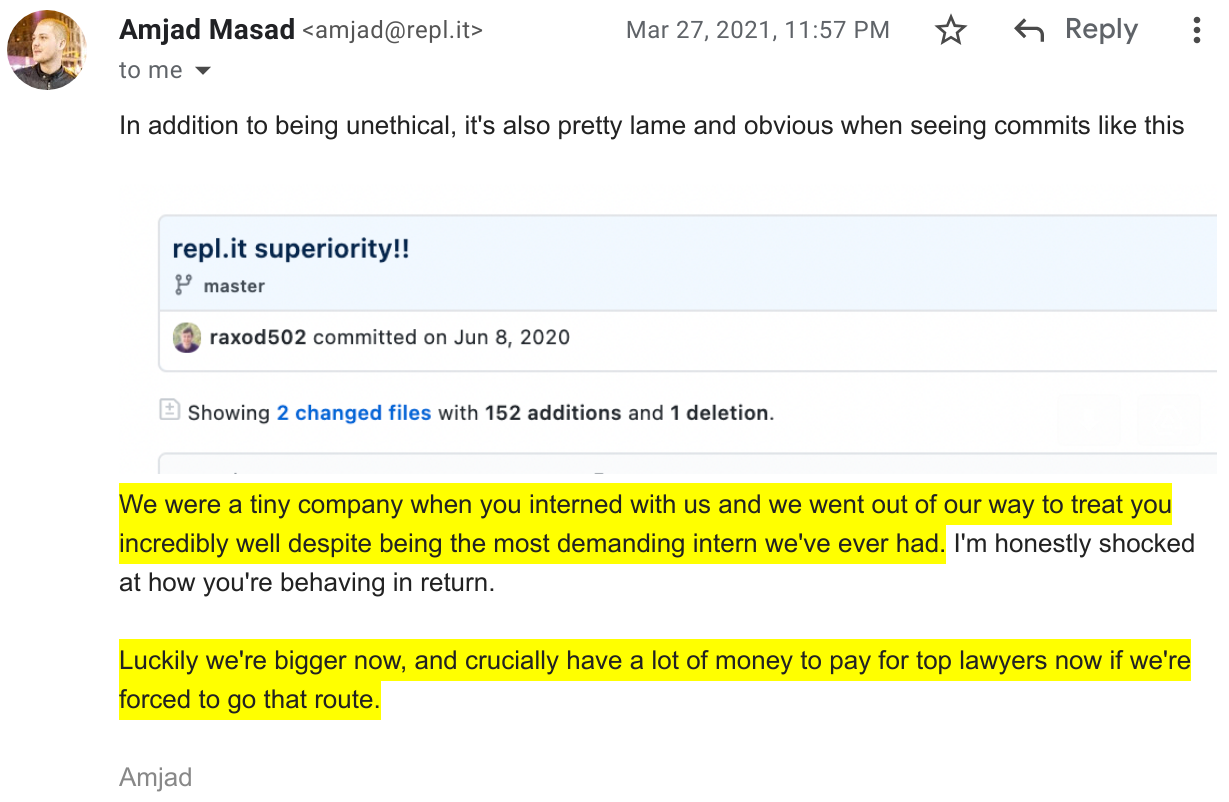
I’d like to point out two things about this email:
- The remark about “commits like this”—this is actually misleading. There’s only one commit in my project that mentions Replit, and it’s the one I already showed you earlier, from my third day of coding, when I’d just added all 38 languages that Replit supported, before moving onto the 178 other languages I wanted to add.
- The remark about me being a “demanding” intern—I’m not actually sure what this is meant to imply, especially since Replit had just tried to recruit me earlier that day (see the screenshot of their first email). But I’ll leave it alone because it’s not really relevant to the issue at hand.
What happened after Replit threatened to sue me?
Naturally, I took down my project right away, gave it some time for feelings to cool, and sent Replit an apology. I figured something might have been lost over email, so I asked to get on a call:
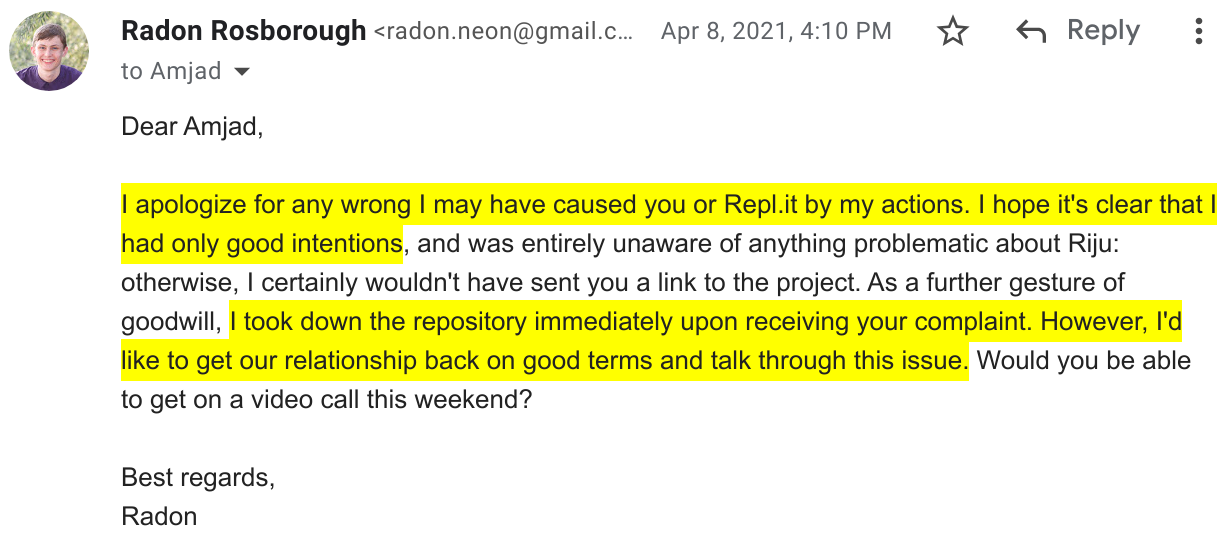
Unfortunately, Replit ignored this email, so I sent them another one following up. This one got a response, but not the one I was hoping for:
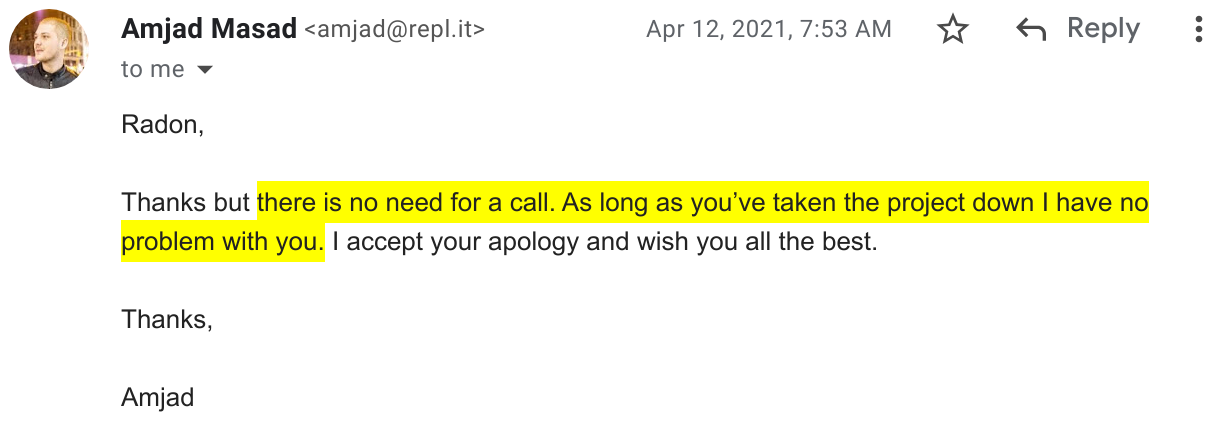
Just in case Replit didn’t understand that I wasn’t OK with this situation, I sent three follow-up emails explaining as such over the next few weeks, all of which were ignored.
In other words, Replit stands by its threat: if I re-publish my open-source project, then they will sue me with “top lawyers”.
Is Replit right?
Replit claimed that my open-source project was:
- a clone of Replit
- based on their trade secrets (“internal design decisions”)
- unethical to build
Let’s examine this claim, part by part:
- In developing my project, was I making a clone of Replit?
- In developing my project, did I make use of any trade secrets of Replit?
- Was it unethical for me to develop an open-source project that’s similar to Replit, after working for them?
Questions 1 and 2 have a fair number of technical details, so I’ve put them in a separate post. The TL;DR is:
- My project isn’t any more similar to Replit than the 15 other (commercial!) ones you can find on Google by searching “run python online” or “online programming environment”.
- Every similarity between my project and Replit can be explained by looking only at GitHub repositories and blog posts that were published online by Replit itself, making them obviously not any kind of secret.
Let’s address question 3 here:
Q: Was it unethical for me to develop an open-source project that’s similar to Replit, after working for them?
In my opinion, the answer to this question is no, for a number of reasons:
- Riju is entirely non-commercial. Unlike Replit, I didn’t seek funding from any source—advertising, donations, fundraising, subscriptions, whatever. I have no interest in running a business, and never really wanted Riju to become too popular, since I was the one paying the server bill.
- Riju wasn’t stealing customers from Replit. Based on my analytics data, there were 38 visits to Riju during the month of February. (Half of those were probably me.) Meanwhile, Replit had over 7 million users. There’s obviously no sense in which Riju was competing with Replit.
- Riju wasn’t built as a competitor to Replit, either. Since the architecture was limited to running on a single server, anyone could bring the entire system down just by typing in a fork bomb—and one of my friends did, just to see what would happen. (The system crashed.) If I were designing a product to compete with Replit, I certainly wouldn’t have picked an architecture that could only scale to toy-project size.
- Replit’s core value proposition isn’t letting you run code online (you can do this in dozens of places for free), it’s the features they offer on top of running code. Riju categorically lacked all of these features, including: having a user account, saving your work, sharing your work, publishing webapps, persistent workspaces, discussion forums, integration with GitHub, etc. etc.
- I had no bad intentions towards Replit when developing Riju, and wasn’t trying to hide anything. As proof of these claims, I offer the fact that I had the project public on my GitHub from the beginning, and the fact that Replit found out about the project because I openly shared it with them of my own volition, extending an offer for them to take inspiration from my work.
- Riju was never intended to be a product, it was intended to be a personal playground / art piece. As proof of this claim, I offer the fact that I spent dozens of hours adding languages like Hexagony and SNOBOL rather making it so you could save your work(!).
I’m not a business person. I’m just an open-source dev who likes to build weird things for fun. (If you doubt my track record of building things that don’t make money, just check out the list on my website, and note the conspicuous absence of anything that’s ever made a cent of revenue.)
I would never try to steal someone’s business after I worked with them. Hurting Replit was not my intent in working on Riju, and to accuse me otherwise—especially without asking a single clarifying question, and refusing all offers to have a discussion—shows a great deal of bad faith on the part of Replit, in my opinion.
If you’d like to decide for yourself who is in the right, I’m happy to put all of the evidence out in the open (except the code, because Replit’s standing by its promise to sue me if I do). Again, I have a separate post with all the technical details. And you can also read all communications between me and Replit, in full and unabridged form, on Imgur, mirrored on the Internet Archive). (Technical details about Replit internals redacted, as well as any statement that could reveal such details indirectly.)
Why would Replit do this?
Replit’s stated ideals include:
- encouraging open-source development (e.g. open-sourcing parts of their technology, adding GitHub support to Replit; Replit’s CEO: “I owe my entire career to open-source”)
- giving back to the community (from the blog post Replit asked me to write: “we are migrating […] to do our part in improving the ecosystem for developers everywhere”; “Giving back to the community. The core of our language-agnostic package management is now open-source on GitHub”)
- making it easy to share and remix your creations (e.g. Replit’s CEO on learning to program: “I’d download projects related to what I wanted to build […] change & tinker with them, and get inspired”; he advises others to fork and remix too, and sells this philosophy as a differentiating feature of Replit)
However, Replit’s actions in this case reveal hypocrisy:
- they say they encourage open-source development, but when my open-source project offended them, they shut it down with extreme prejudice
- they claim to be giving back to the community through their open-source and blog posts, but when I tried to use those ideas in a community project, they threatened to sue me
- they say they make it easy to share and remix your creations—but when I tried to remix Replit itself, I became a persona non grata
In Replit’s emails to me, their threats were based on the fact that I had worked for them in the past. However, I believe this reasoning is a smokescreen. To see why, let’s take a look at some tweets that Replit’s CEO, Amjad, posted just after threatening me by email:
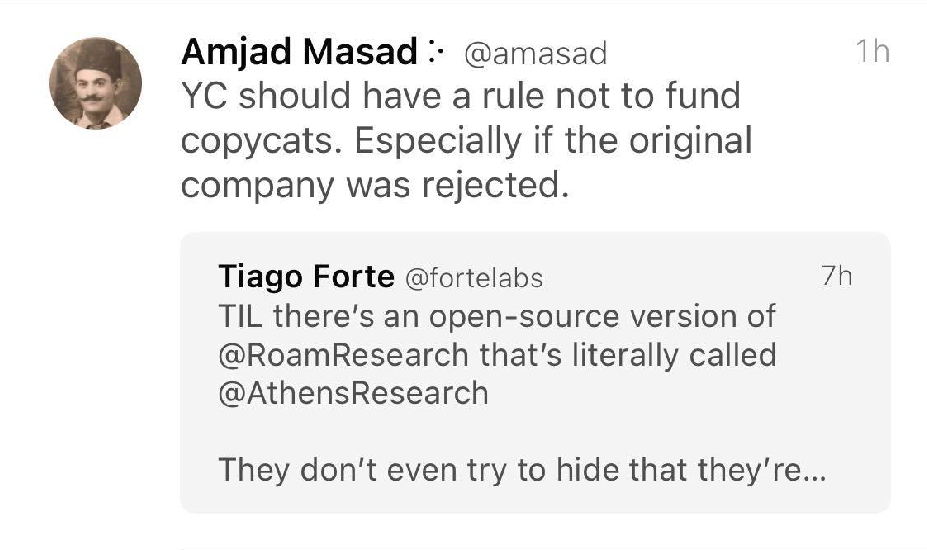

Amjad later deleted these tweets because they proved controversial:
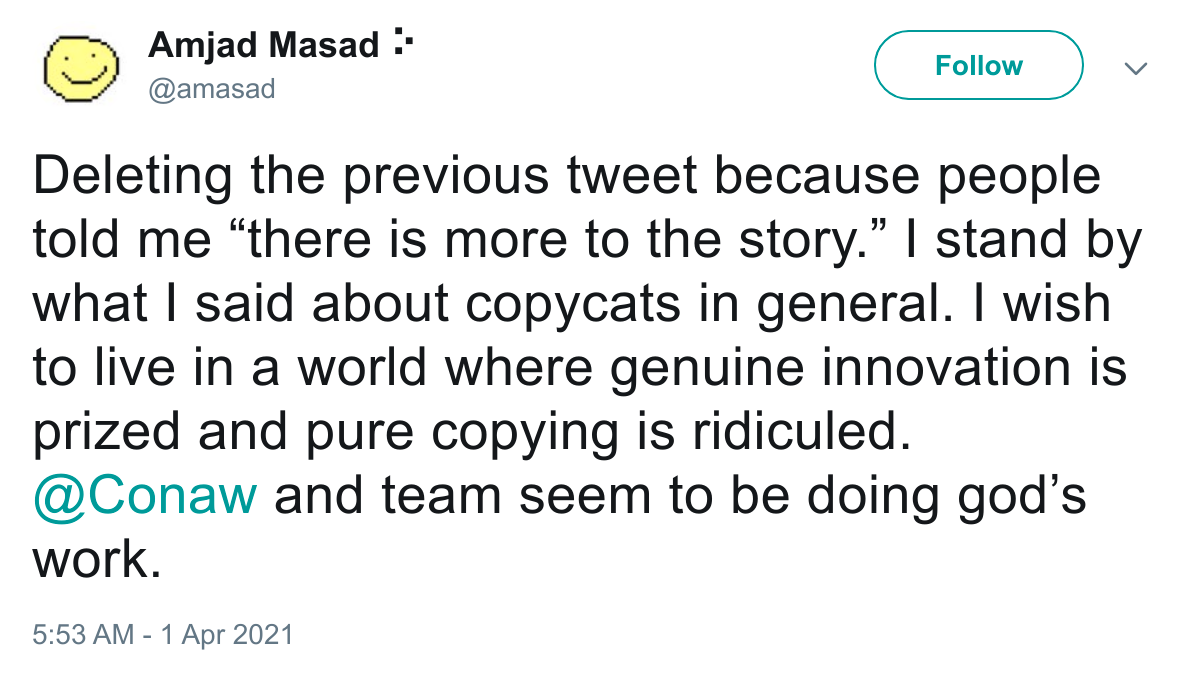
In these tweets, Amjad points out that Athens Research was clearly inspired by another company, and argues that they should therefore be “ridiculed” and banned from receiving funding. Furthermore, he says: “I stand by what I said about copycats in general”, i.e. he disdains all people that he thinks are “copying” existing ones, not just the specific company in his tweet.
There is a clear resemblance between Amjad’s comments on Athens Research and his legal threats towards my own project. He even used exactly the same word, “copycat”, in both. In the case of Athens Research, there was nothing Amjad could do to express his disdain besides denigrate them on Twitter. But in my case, since I had worked for Replit before, Amjad had an excuse to throw accusations my way—accusations that, if you aren’t familiar with the facts, sound like they could be legitimate.
I’d also like to reiterate that the person Replit is threatening with “top lawyers” and “a lot of money” is a new grad with no company, no funding, and no commercial ambitions. If someone with an actual commercial enterprise were to offend Replit, I shudder to think what treatment they might receive.
Radon Rosborough, June 2021
How did Replit respond to this blog post?
After I posted the article in the morning, it was discussed extensively on Hacker News. Around 5pm, Amjad posted an apology on Hacker News, which has also been discussed.
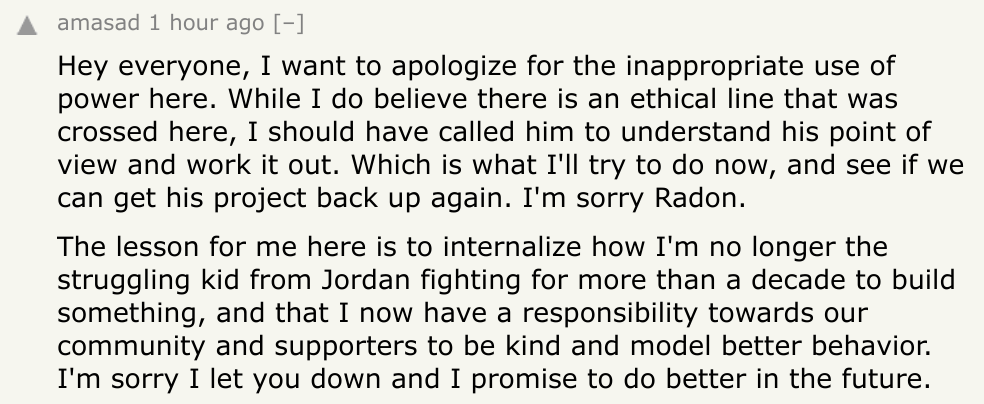
He also reached out to schedule a call, which I naturally agreed to:
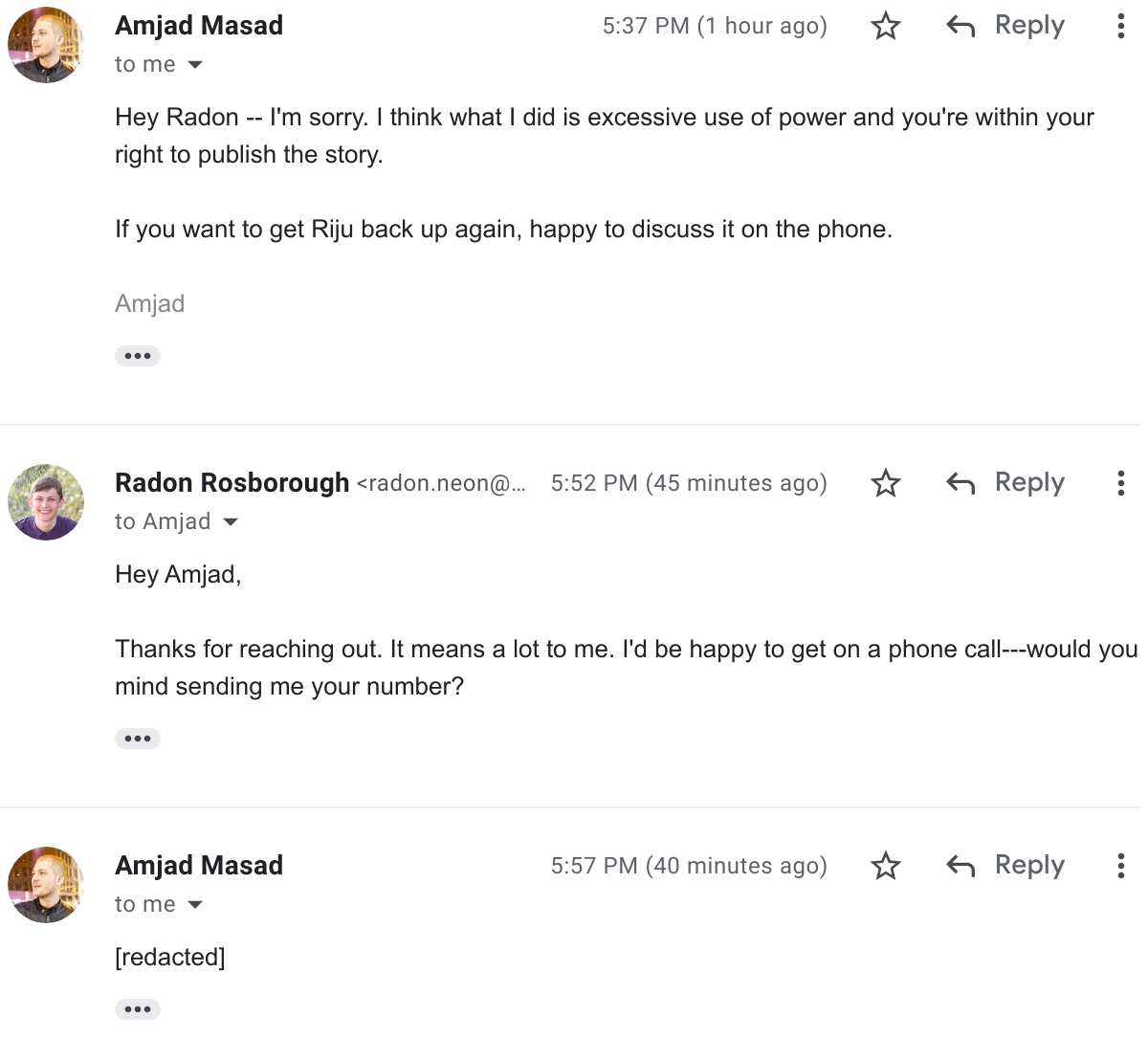
During the call, Amjad apologized for making legal threats, but reiterated that he felt I had made a clone of Replit and that I had acted unethically. Eventually we agreed to disagree, and he promised in writing that he was fine with my putting my project back up:
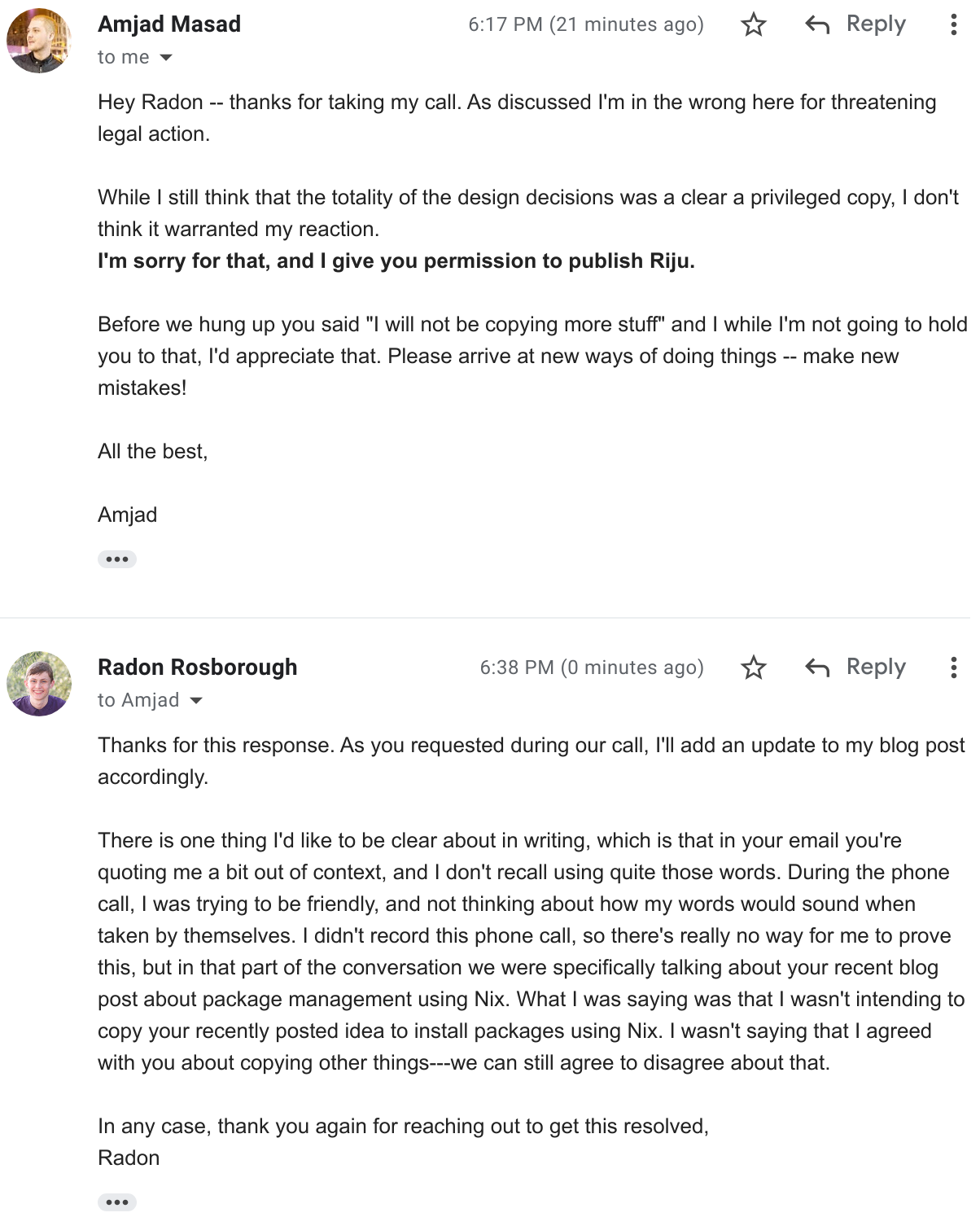
In retrospect, I’m a little disappointed that Amjad:
- didn’t apologize for (or mention) publicly doubling down on his decision to threaten me, and didn’t post an update to that thread after the phone call
- didn’t apologize for (or mention) publicly retweeting an accusation that I “literally stole and published IP”, although he did at least delete the retweet
- didn’t apologize for (or mention) making a nebulous personal attack in writing that I was a “demanding intern” right after trying to hire me
- said in the phone call, right after “apologizing”, that he felt as if he had invited me into his house and I had betrayed his trust
- still refused to list any specific part of Replit he thought I had copied, even when I asked him for such details multiple times during the phone call, despite his continuing to claim both privately and publicly that I copied Replit unethically
- misquoted me in writing to make me look like I agreed with his accusations, right after reaching out to apologize for his behavior
All in all, I think this could have gone better.
Nonetheless, I’m happy that we were able to get the situation worked out amicably, and I look forward to moving on with my life—including putting Riju back up, after I can get things compiling again :)
Peace.
So is Riju back up now?
Yes! Check it out at https://riju.codes/, and join the community on GitHub at https://github.com/raxod502/riju. I’d love to work on the project with you <3
(Please note that Riju is only available on IPv6-enabled networks due to the higher financial cost of supporting legacy protocols. If your network does not support IPv6 then please consider asking your network administrator or service provider to do their part in supporting modern internet standards. You can consider accessing Riju through a VPN as a workaround.)
Mandatory legal notice: This blog post is maintained by Radian LLC.